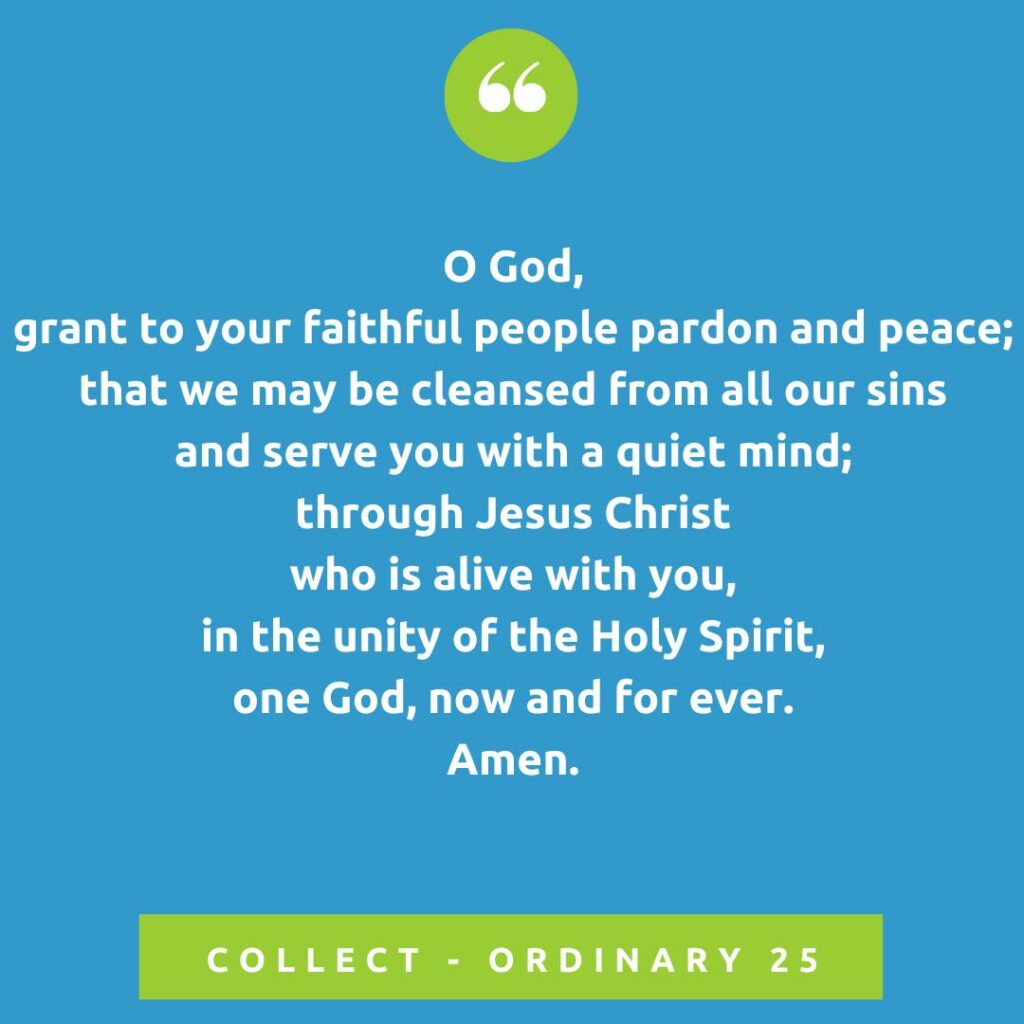
Let us pray (in silence) [that we may live as forgiven people]
pause
O God,
grant to your faithful people pardon and peace;
that we may be cleansed from all our sins
and serve you with a quiet mind;
through Jesus Christ
who is alive with you,
in the unity of the Holy Spirit,
one God, now and for ever.
Amen.
This collect is drawn from the September masses of the Gelasian Sacramentary:
Largire, quaesumus Domine, fidelibus tuis indulgentiam placatus, et pacem: ut pariter ab omnibus mundentur offensis, et secura tibi mente deserviant.
Per Dominum…
My rendering, above, is almost the same as found in NZPB (1989-2005) p. 577b. A literal translation of the Latin is:
Having been appeased, impart to Your faithful, O Lord, we beseech You, remission and peace: so that in an equal measure they may be cleansed from all sins, and may zealously serve You with a mind free from anxiety.
From the Sarum Missal until the 1928 BCP it was the collect for Trinity 21. First translated 1549 as:
GRAUNT we beseche thee, merciful Lord, to thy faithfull people pardon and peace, that they maye bee clensed from all. their synnes, and serve thee with a quiet mynde. Through Jesus Christ our Lorde.
Following contemporary liturgical practice, “…that they may be cleansed from all their sins…” was changed to “…we…” The Latin original had “secure” where we have “quiet”.
Philosophically, materialism is the belief that all can be reduced to physical particles and the laws of physics that govern them. Atheistic materialism, to be consistent, has no room for free will – even of the most limited kind: the free will to choose if I will raise my hand now or not. For them, the raising or lowering of my hand is determined by the movement of particles in my brain. For materialists to turn to Quantum Theory that we cannot determine both velocity and position of particles is not to make room for free will – it merely results in a theory that our hand goes up and down randomly! Christian belief in free will is a belief that cause and effect is broken by free human beings – in the image of a free God.
Forgiveness is another break in the chain of cause and effect. The bad that has happened in the past continues on into the future. Forgiveness breaks that chain reaction. Forgiveness to be effective needs to face the past (“pardon”) and the future (“peace” – reconciliation).
Roman Catholics use it from the 1962 Missal in the Extraordinary Rite on Pentecost 20.
NZPB (2020) has it on p633 Year B Ordinary 7 where it is also in Te Reo Māori:
E te Atua aroha,
hōmai ki āu hunga pono he murunga me te rangimārie;
kia pūrea ai ō mātou hara katoa
kia mahi ai mātou i runga i te whakaaro māhaki;
Ko Īhu Karaiti tō mātou Kaihoko.
Common Worship Trinity 21:
Grant, we beseech you, merciful Lord,
to your faithful people pardon and peace,
that they may be cleansed from all their sins
and serve you with a quiet mind;
through Jesus Christ your Son our Lord,
who is alive and reigns with you,
in the unity of the Holy Spirit,
one God, now and for ever.
Amen
South African Anglican Prayer Book Epiphany 4:
Merciful Lord you are the only giver of pardon and peace:
cleanse us your faithful people from our sins
that we may serve you with a quiet mind;
through Jesus Christ our Lord…
